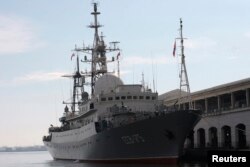In recent years the world has witnessed a gradual rapprochement between Russia and some Latin American countries. High-level visits, trade agreements, military exercises and arms sales are some of the activities that the Kremlin and nations such as Venezuela, Cuba or Nicaragua have carried out.
But what consequences will the war in Ukraine have for Russian President Vladimir Putin’s ambitions in the region? Analysts Anna Ayuso, senior researcher at the Barcelona Center for International Affairs (CIDOB) and Stanislav Secrieru, senior expert of the European Union Institute for Security Studies (EUISS), based in Paris, analyzed these issues within the framework of the event “The war in Ukraine: A turning point in Russia’s influence in Latin America?”
Rapprochement between Russia and Latin America in recent years:
According to Anna Ayuso, one of the main reasons for Russia’s gradual rapprochement in Latin America in recent years has been “the search for a more global presence.”
Likewise, according to the analyst, the approximation of positions has also occurred because of the role that the US has played in the region:
“For many years, the United States has abandoned Latin America and has turned the region into a kind of playground between friends and enemies that has fostered a certain polarization within the countries and a fragmentation within cooperation. Russia has taken advantage of these divisions to increase its presence, allying itself with those countries that challenged the hegemony of the United States,” says the expert in reference to Venezuela, Cuba, Nicaragua and Bolivia.
For Stanislav Secrieru, another reason for the presence of the world’s largest country in Latin America is “to widen the gaps and divisions between Europe and the United States”:
“Even if they are allies, both sides have different perspectives of what is happening in Latin America and how to achieve the interests in that region. From the Russian point of view, it is much better to divide this transatlantic community and the EU rather than keep it all together as if it were an alliance”
The analyst also highlights that in the past the region “helped to balance the negative impacts of Russian policies” after the country created a food embargo in 2014 in response to the sanctions imposed by the EU and the US after the annexation of Crimea.
“Ecuador was the largest exporter of fruit to Russia after Turkey,” says Secrieru, who also stresses that “Argentina, Brazil, Paraguay and Chile were very important in compensating for the shortage of meat, fish, soybeans and derivatives.”
Russian influence is “relatively low”:
In the current context, conditioned by the war between Russia and Ukraine, Ayuso points out that Russian influence in Latin America “is focused on some strategic points”, and stresses that “it is relatively low”; Above all, at the military level, where despite carrying out collaborations with Latin American armies, the Kremlin does not have “a fixed presence” or “military bases.”
Regarding trade, Ayuso says that although the commercial activities of the Kremlin on the continent “have grown”, they are still small compared to international actors such as China.
According to the expert, one of the commercial areas where Russia is most relevant is in the export of weapons, in addition to the sector of raw materials and hydrocarbons:
“It has its capabilities and has taken advantage of those gaps,” says the analyst, who also points out that the country led by Putin “has tried to penetrate other sectors,” such as technology, where it would not have been as successful: “In Latin America, some countries They are already realizing that (Russia) can be competitive in price but not in technology”
They predict that Russia’s presence in the region will continue to grow
But how will the relationship between Russia and the region evolve as the war in Eastern Europe continues?
The experts point out that, until now, although “the majority advocates a negotiated solution”, there has been no unity in Latin America when it comes to condemning the invasion and that there are “changing voices” regarding the conflict.
On the other hand, as a result of the weakening of the Russian economy, Sacrieru points out that Russian trade in Latin America could decline. In part, because after the Russian announcement through which reservists will be mobilized, the country will need military equipment that it will not be able to export.
A similar opinion is held by Ayuso, who also expresses that due to inflation, Latin American countries will be harmed “by the increase in prices of products such as fertilizers or supplies.” However, the analyst points out that countries like Venezuela, one of the nations in the region that produces oil, could be “favored” by the increase in energy prices.
On the other hand, Stanislav Sacrieru explains that the Russian presence on the continent will continue to grow, in part, because of the shift to the left that the region has experienced:
“It is generally seen in Moscow that people on the left political spectrum are much easier to deal with and work for Russia than compared to the center-right parties,” he explains.
Connect with the Voice of America! Subscribe to our channel Youtubeand turn on notifications, or follow us on social media: Facebook, Twitter and Instagram.

















Add Comment